Looking to the future









In the wake of the UK’s de parture from the European Union, efforts to reorient its international trade have led to a series of bilateral agree ments with Singapore.

In December 2020, then-In ternational Trade Secretary Liz Truss flew to Singapore to sign a free trade agree ment (FTA) between the two na tions, a pact she hailed as signi fying Britain’s re-emergence as “a major force in global trade.”
Amidst the UK’s post-Brexit ambi tions to reposition itself as “Glob al Britain,” Singapore was a nat ural choice of early partners with whom to seek a continuity trade agreement, given the deep histori cal, institutional and cultural ties between the two countries. More over, the move was a pragmatic one for both sides: Singapore is Britain’s largest trade and invest ment partner in Southeast Asia, and Britain is one of Singapore’s top European investment desti nations. According to UK govern ment statistics, the value of trade between the countries stood at GBP£17.2Bn in 2022.
Since the signing of the FTA, re lations between the two nations have only grown stronger. A joint statement issued in March 2021 affirmed their shared commit ment “to expand our coopera tion for the benefit of our mutual prosperity and security,” setting out pledges to work together on areas including the economy and trade, climate and sustain ability, technology, se curity and more. The statement also made a point to emphasise the “extensive peo ple-to-people links be tween our two coun tries,” underscoring that UK-Singapore ties go far beyond just trade and investment.
Nonetheless, the realpolitik un derpinning the joint statement was evident in the priority given to mention of the UK’s applica tion to join the Comprehensive and Progressive Agreement for Trans-Pacific Partnership (CPT
PP). Made up of 11 nations, CPT PP is one of the world’s largest free-trade areas, membership of which is sought by the UK gov ernment in order to open up new export markets and expand its in ternational trade. Singapore’s sta tus as an economic heavyweight in the region made its statement of support for Britain’s accession carry outsize importance.
In February 2022, the signing of the landmark Digital Economy Agreement (DEA) marked a fur ther milestone in UK-Singapore relations. Described by British negotiators as “the world’s most innovative trade agreement,” the pact covers digitised trade in goods and services between the countries, while establishing rules around cross-border data flows
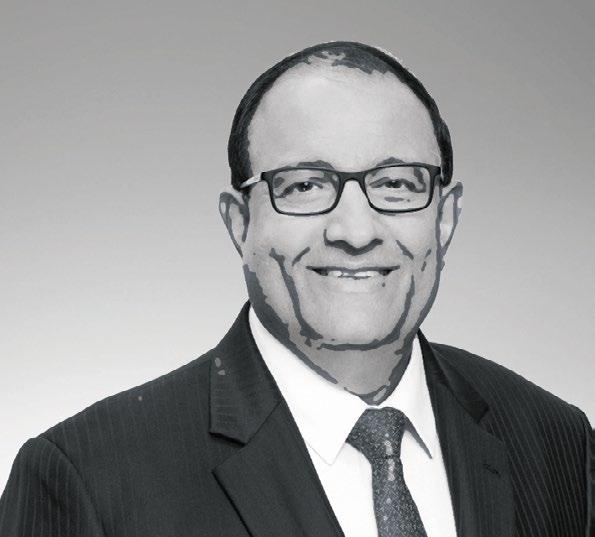
and protection, digital identities and more. The deal was the first of its type signed by Britain, and the first between an Asian and Euro pean nation. In his remarks at the signing ceremony, Singapore’s Min ister-in-charge of Trade Relations S. Iswaran said, “The expeditious conclusion of this cutting-edge agreement reflects strong trust be tween two like-minded and digi tally progressive nations.”
The real-world impacts of the DEA are already becoming ap parent. In September 2022, Sin gapore hosted delegates from 24 British businesses, representing cutting-edge sectors including lawtech, cybersecurity and driv erless cars, with the visiting com panies citing the DEA as support ing their expansion plans in the Asia Pacific region. “Singapore is a gateway to the rest of Southeast Asia, which has a digital economy projected to reach $1 trillion by 2030,” said Natalie Black, Brit ain’s Trade Commissioner for Asia Pacific. “Our UK-Singapore Digi tal Economy Agreement will make the most of this opportunity.”
Singapore is Britain’s largest trade and investment partner in Southeast Asia
“Singapore is a gateway to the rest of Southeast Asia, which has a digital economy projected to reach $1 trillion by 2030”Natalie
Black UK Trade Commissioner for Asia Pacific
The UK-Singapore Digi tal Economy Agreement “reflects strong trust between two like-minded and digitally progressive nations”
S. Iswaran Minister-in-charge of Trade Relations
Singapore’s efforts to diversify its economy in recent years have further enhanced the nation’s appeal as a destination for business.
Singapore’s reputation as a safe, stable and support ive place to do business remains unchallenged. Recently ranked first in the world for political and operational stabili ty in Cornell University’s Global In novation Index, and third in IMD’s World Competitive ness Report, the gov ernment’s pro-busi ness policies continue to attract companies of all stripes: 80 of the world’s top 100 tech firms have a presence in Singapore, while the Republic is home to 55,000 start-ups.
Those figures demon strate the diversified nature of the city-state’s economy. “Singapore is not just a hub for fi nancial services,” says Jacqueline Poh, MD, Singapore Economic De velopment Board (EDB). “Manufac turing accounted for about 22% of Singapore’s GDP in 2021, and we have become a hotspot for advanced manufacturing.” EDB figures reveal that more than 50% of 2021 fixed asset investment was driven by sem iconductor and biotech firms.
Many factors play into Singapore’s attraction to business. Sustained investment in research, innova
tion and enterprise are a corner stone of Prime Minister Lee Hsien Loong’s economic strategy, and the RIE2025 plan commits to spend ing c.1% of GDP (S$25Bn) over the period 2021-25. Meanwhile, the S$20m Corporate Venture Launchpad scheme enables com panies to partner with EDB-appoint ed venture studios to launch new ven tures in Singapore within six months.
Singapore is also a gateway to the Southeast Asian market that is on track to become the world’s fourth largest by 2030, and all of this is underpinned by poli cies designed to attract and retain a world-class talent pool.
In 2021, Prime Minister Lee launched the Singapore Green Plan 2030, outlining five pillars for the nation’s sustainable devel opment. Covering measures from investments in renewable energy to expansion of green spaces, the plan sets forward policies that “harness es sustainability as a competitive advantage” – placing technology, innovation and the green economy at the heart of the nation’s future.
The Singapore Economic Develop ment Board (EDB) is tasked with creating sustainable economic growth in Singapore. The govern ment agency facilitates investment and growth for domestic and international firms, and has worked closely with global companies, including British businesses and talent, who are leveraging Singa pore’s role as Southeast Asia’s leading business hub.
BIO Education
Holds degrees from both the University of Oxford (PPE) and the University of Cambridge (MPhil)
Values Advocates for developing female leaders and improving the lives of Singaporeans through tech and innovation Successes Member of multiple boards, including: the Infocomm Media Development Authority; Defence Science and Technology Agency

What advantages and opportunities does modern Singapore present to businesses?
Singapore is known to be business-friend ly, with regulatory certainty. Our status as a stable, predictable, neutral location for businesses, talent and investment has been enhanced during this time of political and economic uncertainty. Singapore ranked as the world’s third-most competitive economy in the IMD World Competitiveness Ranking report for 2022, and ranks among the top countries for ease of doing business and strength of global connectivity. Singapore is not just a hub for financial services, professional services, shipping and tourism. Manufacturing accounted for about 22% of Singapore’s GDP in 2021, up from 18% in 2015. We have become a hotspot for advanced manufacturing, with more industrial firms using digital technology to power production facilities and improve their sustainability, research and development and supply chain management.
In 2021, we secured 7.3 billion pounds of fixed asset investments, most of which were from the electronics, semiconductors and biomedical manufacturing sectors, as well as the digital economy.
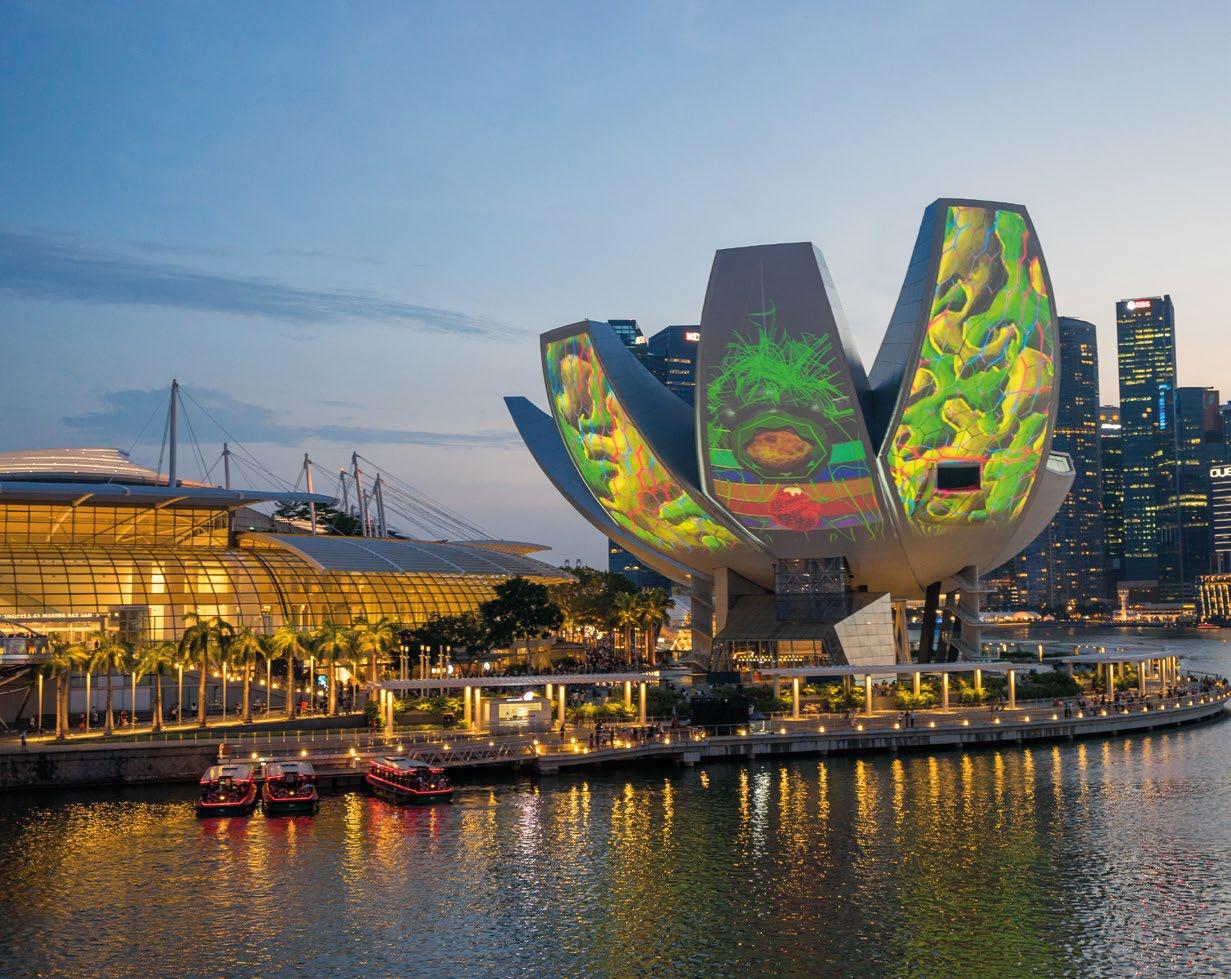
Businesses come to Singapore to leverage our vibrant and creative innovation eco system. Singapore has the world’s best digital environment and support system for entrepreneurs, according to the Global Index of Digital Entrepreneurship Systems released by the Asian Development Bank.
Singapore is a great entry point to Asia, particularly the Southeast Asian production base and market. Southeast Asia is a region of 650 million people and is on track to be coming the world’s fourth-largest economy by 2030.
We have built a vibrant innovation eco system with a world-class talent pool that can deliver cutting-edge solutions. We are investing 15.4 billion pounds (S$25 billion) in a Research, Innovation and Enterprise plan
that will include translation, commercialisa tion and innovation strategies.
How can Singapore’s relationship with the UK help Britain meet its goals of becoming a more global country post-Brexit?
As twin business hubs, Singapore and the UK complement each other well. The UK-Singapore Digital Economy Agreement (UKSDEA) which came into force earlier this year brings tangible benefits to businesses around electronic documents and invoices. The UKSDEA’s design allows trusted data flows, especially for financial services. It also provides a secure digital environment to be established between Singapore and the UK. We also hope to expand the scope of bilat eral agreements around the green economy and sustainability in the future.
UK companies can approach the EDB’s London office for help setting up their busi nesses in Singapore. Starting a business in Singapore is an interesting proposition since it has low tax rates for individuals and com panies as well as zero capital gains tax. As a global city, Singapore wants to attract and retain a diverse, world-class talent pool.
Singapore takes its climate action goals seriously and has raised the bar for its ambi tions related to climate change, with a net-zero ambition by 2050. We also ensure that Singa pore’s efforts are in line with global efforts on sustainable development. The Singapore Green Plan is a blueprint created two years ago that cuts across government agencies, as well as people and the private sector, and explains how we are intending to meet our net-zero targets.
Jaqueline Poh Managing Director, EDB
“As a global city, Singapore wants to attract and retain a diverse, world-class talent pool”
80 of the world’s top 100 tech firms have a presence in SingaporeMarina Bay. Photo: shutterstock
Long-regarded as a traditional financial services powerhouse, Singapore is home to a growing community of start-ups, disruptors and innovators who are shaping the future of finance.


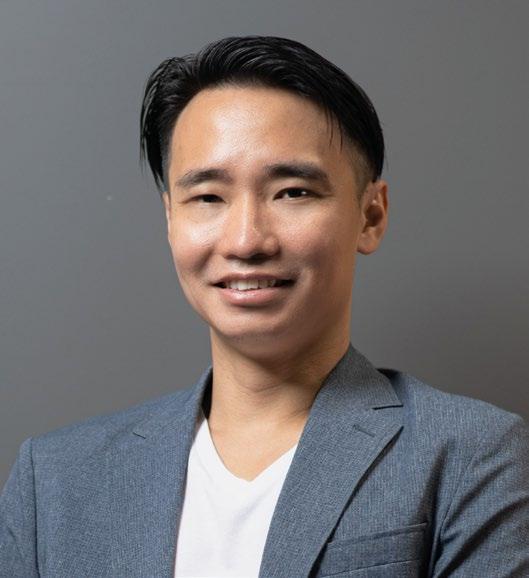
Klaytn bills itself as an open-source public blockchain for those who want to build, work, or play in the metaverse. The Klaytn Foundation oversees this project.
“We left Hong Kong back in 2016 because my bet at the time was that the Singaporean government would be a lot more progressive in terms of how they looked at their Fintech and blockchain policies. Looking back
now, seven years later, I was right. Singapore has always been at the fore front of evolving technol ogy. It’s also very easy to pick out skill sets to plug needs when you’re a foreign company setting up here.”
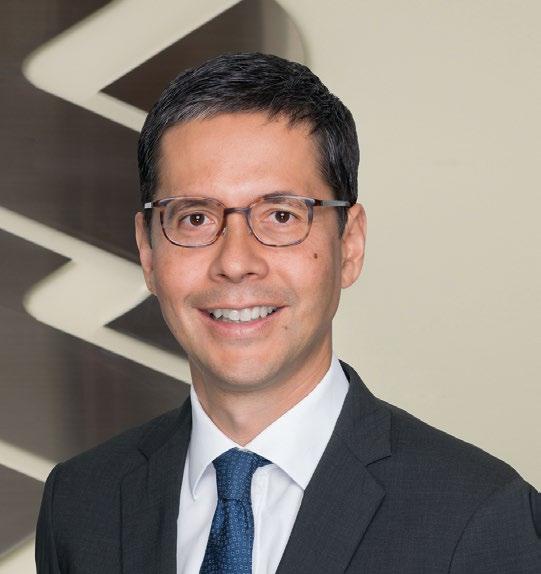
one of the oldest and largest financial institutions in Singapore, Cluster CEO Patrick Lee is keen to stress Standard Chartered’s commitment to the digital future.
“Our ambition is to harness our digital initiatives to real ly make a mark and contin ue the deep history we have here in Singapore. We’ve invested heavily in digi talization and are leading the way among traditional banks in terms of looking
at embracing change and innovation. We brought the latest cutting-edge digital banking to Hong Kong in the form of Mox Bank, and now we have also launched Trust Bank in partnership with FairPrice Group in Singapore.”
Launched in 2015, Funding Societies is Southeast Asia’s largest SME digital financing and debt investment platform. Their mission is to uplift societies by cre ating financial opportunities.
“Success and failure in Fin tech is very much driven by regulation. In Singapore we have the benefit that regu lators proactively regulate the industry, and we are able to directly work with them. We’re really excited about the UKSDEA agree
ment as the UK has one of the most innovative Fintech markets. We are really looking forward to work ing together with your key players, both from a capital and technology know-how perspective, to further enhance our business.”
Sygnum is the world’s first digital asset bank,
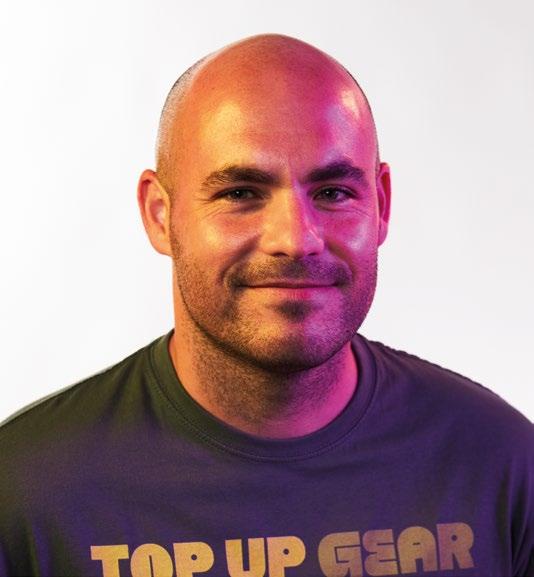
also the first digital asset special ist with both Swiss banking and Singapore asset management licences.
“Traditional banking and the cryptocurrency world have, for a long time, been eyeing each other up very suspiciously. We allow financial institutions, corporations, and high-networths to onboard crypto and digital assets with complete trust and peace of
mind. We are regulated by a credible, incredible jurisdic tion here in Singapore, and the UK-Singapore Digital Economy Agreement will further serve to boost dig ital trade and encouraging innovation when it comes to building more trust in digital environments.”
Founded in 2011, Coda helps digital content publishers unlock new revenue streams for their games, apps, and services across more than fifty markets.
“Our success comes from listening to the needs of the publishers, the payment partners and the end users and slowly building over time a comprehensive set of bespoke solutions. The COVID pandemic has accelerated the trend
towards digital consump tion, and we couldn’t be more excited about the future and the role that Coda will continue to play in this ongoing development, as we move towards becoming the de facto payments platform of choice.”
Kelvin Teo CEO
“Singapore has always been at the forefront of evolving technology”
“In Singapore we have the benefit that regulators proactively regulate the industry”
As
“We’ve invested heavily in digitalization and are leading the way among traditional banks”Standard Chartered Singapore
Gerald Goh Co-founder and CEO
“We allow institutions to onboard crypto and digital assets with complete trust and peace of mind”
Philippe Limes CEO
“When Activision and EA see you as a valuable partner, you know you’re doing something right”
and

As CEO of Legatus Global, a fintech company that enables and facilitates the safe adoption of digital pay ments, and also Kaizenixo, a Web 3.0 metaverse mixed reality platform, Kevin Pang is a leading expert on digital assets, cryptocurrency and the technologies that under pin the sector.
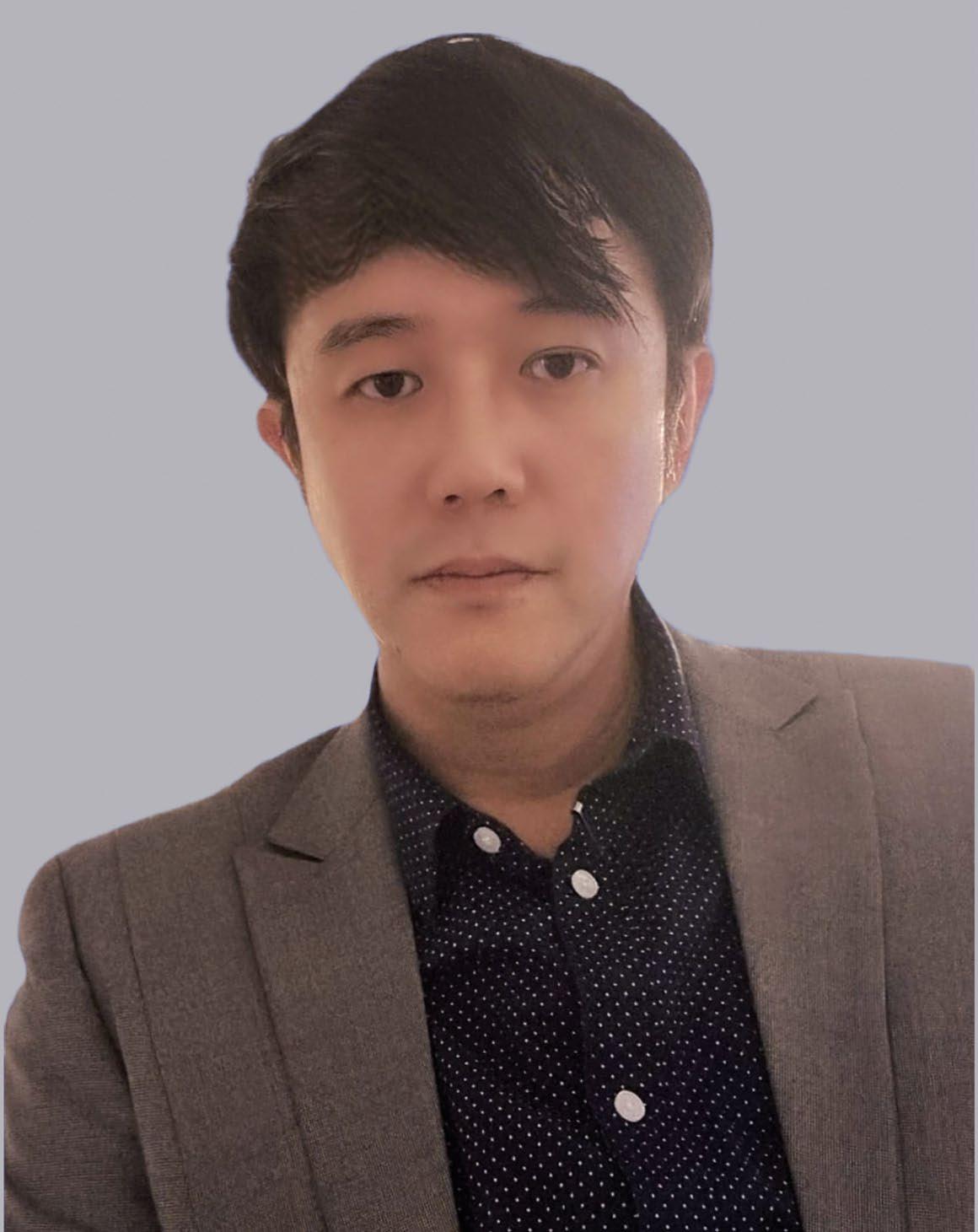
The pandemic has accelerated changes to the global economy that were in a way inevitable, including digitalisation. As someone who works closely with the financial services sector, digital payment systems and blockchain, what effects have you observed on the industry?
The pandemic has been one of the greatest drivers behind the accelerated adoption of digital currency. When countries went into lockdown, people were forced to go online for their shopping. And the only way to pay for things was through digi tal payments.
Now, fast forward to 2022: we’ve seen lots of shops go cashless with card or contactless payment; as such, we are accelerating the technology associated with digital payments, like blockchain, AI and everything that sustains the digital payment ecosystem. Digital currencies are also gain ing prominence; China has just started using the digital yuan as a form of payment instead of cash, while the UK and Singapore are also discussing the use of a sovereign digital currency.
You’ve said that Legatus Global acts as an intermediary between traditional and digital payment systems, but as an enabler rather than as a disruptive technology. Can you expand on that perspective?
We are not here to disrupt the traditional financial services framework, which is something a lot of fintech companies say about themselves. One thing we do is provide the ability to send money from a bank account to a digital wallet anywhere around the world. It sounds easy, but if you run it
through the traditional framework, the cost and time will be higher because you’ll have to go through banks, so in this case the crypto currency/digital currency could be a very effective replacement for intermediary banking; the money can be sent in cryptocurrency, and at the end point converted back into fiat currency.
We also offer cross-border facilities, enabling travellers to use digital payments. Even in countries where they don’t have a bank account, people can eas ily use our banking app to send dollars to a wallet in a different part of the world and receive the local currency.
You’ve partnered with DBS Bank’s Startup Unleashed programme. Can you comment on this and other key partnerships in Singapore and elsewhere?
DBS Bank’s Startup Unleashed programme accelerates highgrowth emerging start-ups; we have the opportunity to work with them on new ways of doing bank ing. Globally, we are also engag ing in partnerships with various crypto payment wallets through a borderless cryptocurrency pay ment technology, working to facil itate the use of crypto payments around the world. We can operate legally in Singapore, and in that sense we are key since some of these providers aren’t looking to get a license there, as they are more focused on other liberal financial hubs, like Dubai.
In Asia, we’re trying to operate in different northern regions, par ticularly Korea and Japan, where we have the intention of applying for licenses, and also in the West, including London and the US. We want to get a foothold in global financial centres, and from that position help our partners and other payment providers who do not have the regulatory expertise to operate legally in those coun tries, supporting them in their efforts to expand in a regulated manner. Our strength lies with regulations and compliance, espe cially in countries like Singapore, which has taken a lead in terms of regulation. This experience gives us an advantage, enabling us to operate around the world – not just in terms of digital payments, but cryptocurrency as well.
How will the Digital Economy Agreement (UKSDEA) signed between Singapore and the UK benefit Legatus and the wider industry?
This agreement is a very big deal in terms of East-West cooperation. The UKSDEA will help UK com panies access the Asian market quickly through Singapore, and at the same time, it will allow our companies access to the UK, which can in turn serve as a springboard into the nearby European Union. London is a major financial hub in the West, so we’ve started the process of becoming incorporated and licensed in the UK, and be cause of this agreement, national regulators will be sharing notes to facilitate their understanding of current regulations. Singapore, being a former British colony, applies common British law, so the regulations in both countries are very similar, making it easier for Singapore-based lawyers and consultants to understand the reg ulations in the UK, and vice versa.
think that by the time we complete the licensing and registration process, it will be the second half of 2023. Our final timeframes are dependent on what kind of licens ing or registration we apply for.
You are also the CEO of Kaizenixo, a next-generation blockchain platform. What does the platform do, and how do your companies complement one another?
They’re separate companies that have different businesses. Kaizenixo is not considered a financial services company but a gaming and media company. Decentralised finance is not a fully regulated industry, and I am using Legatus to provide regula tory support for the activities of Kaizenixo, to ensure we are fu ture-proofed in case regulations change and force the company to operate elsewhere.
What are your expectations for the completion of this process of incorporation?
I think the UK office will be op erational in February 2023, and I

Kaizenixo is a Web 3.0 metaverse mixed reality platform powered by the real world economy. The NFT marketplace function has been proven to be a good platform for charity initiatives, compared with other platforms out there. In Singapore, we are also supporting groups like SATA and other local charities. Because NFT growth has been exponential, the sector is attracting the attention of banks and traditional big brands like Co ca-Cola and McDonalds. So this is the right space to be in right now, and we are looking at various big brands to potentially start pilot programmes for, and consulting with these companies as an NFT marketplace.
We are taking a different ap proach from other metaverse pro jects as we focus on mixed reali ty experiences driven by the real world economy. This includes a virtual clubhouse linked to real clubhouses around the world. The metaverse is not straightfor ward, it correlates with the real world, which means there are services in the real world which can be used in the virtual world; they’re not separate.
“We are not here to disrupt the traditional financial services framework, which is something a lot of fintech companies say about themselves”Minister of Education Mr. Chan Chun Sing presents an award in appreciation for supporting public education

A pro-innovation environment and supportive government policies have ensured that Singapore has all the resources to enable global companies to thrive.
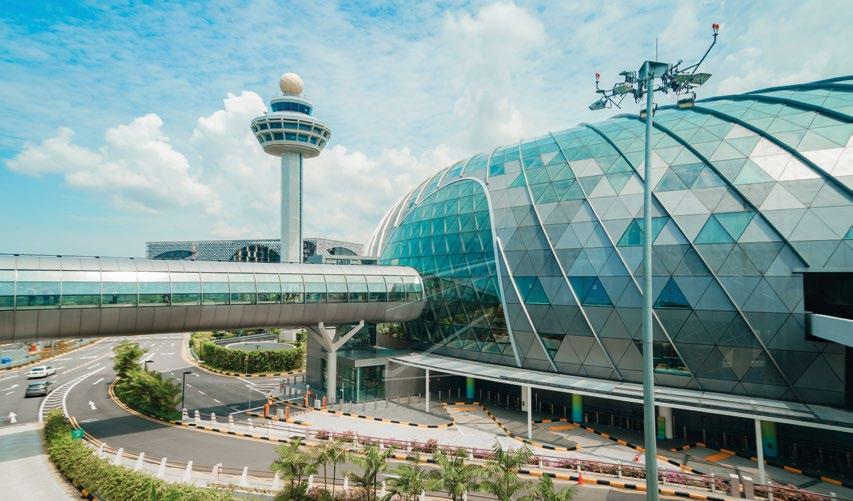
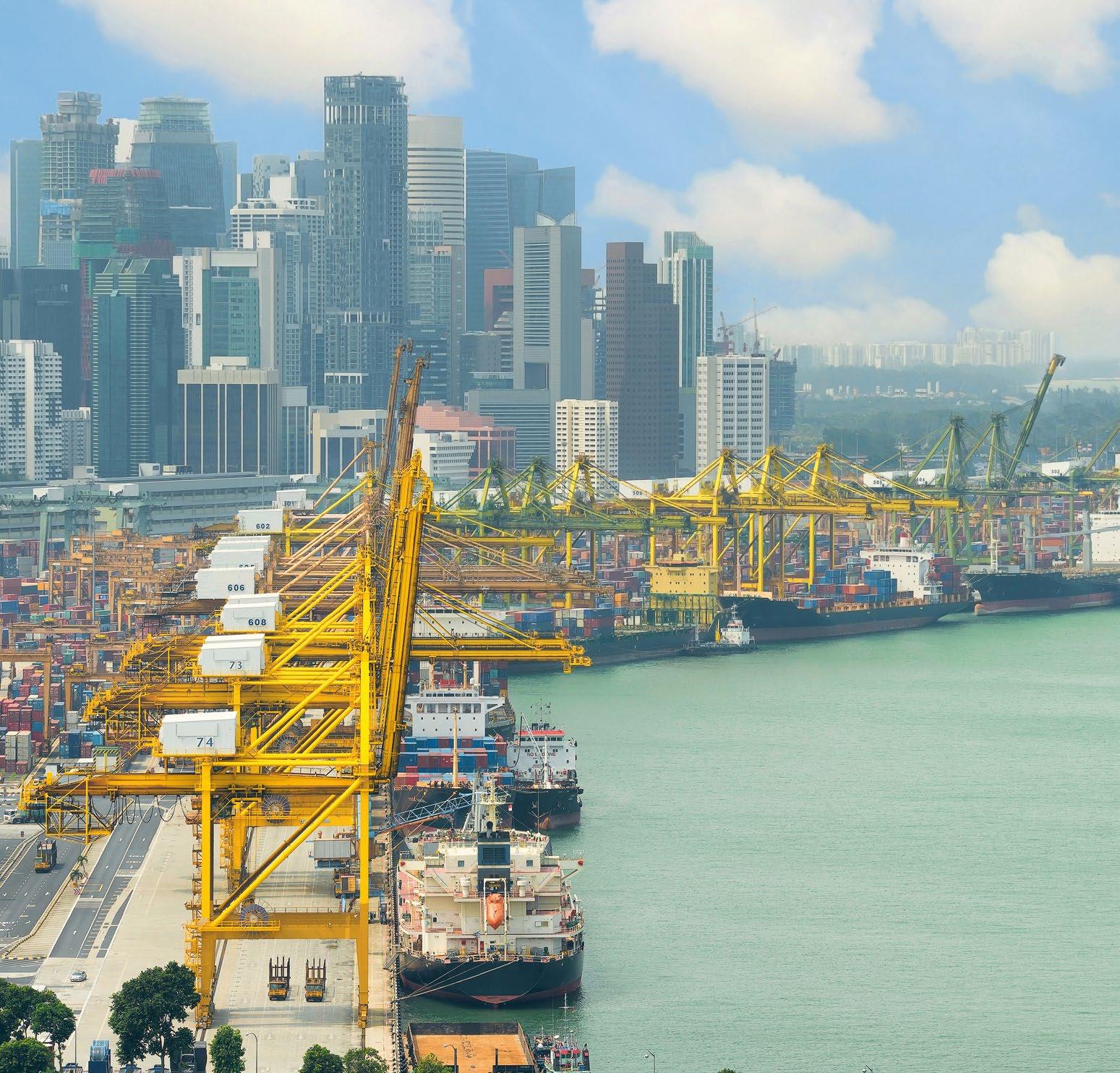
With 24 implement ed free trade agree ments (FTAs), and Economic Partner ship Agreements covering over 60% of global GDP, Singapore has long been seen as a regional hub of choice for international businesses. Key to this success is a highly skilled and adaptable workforce, ranked second in the 2017 Glob al Talent Competitiveness Index. This has attracted one of the highest concentrations of brand marketers in the Asia Pacific region, including MasterCard, P&G, Intel, Philips and Unilever. In addition, leading firms such as Shell, Micron and Merck have chosen Singapore as a strategic manufacturing hub. The country is the world’s fourth-largest global exporter of high-tech goods, and produces four of the world’s top 10 drugs. The vibrancy of the manufac turing ecosystem has led companies to site not just production facilities here, but also their headquarters, R&D, and supply chain functions.

A key global distribution center, Singapore has been ranked by the World Bank as Asia’s top logistics hub for 10 years in a row, offering worldclass connectivity to the re gion and beyond via strong air and sea links. Always looking to the future, the government has employed a ‘sandbox’ approach to inno vation which cushions against failures by fostering an envi ronment ripe for experimen tation. This has attracted a growing community of over 55,000 start-ups.
Founded in 2010, A-Plus Automa tion uses its in novative outlook and technological exper tise to develop bespoke solutions for custom ers’ material handling requirements. Ranked among The Straits Times’ “fastest-growing compa nies in Singapore” for 3 years in a row, A-Plus provides a complete ser vice from design to en gineering, project man agement, installation and after-sales. Recently expanding its manufac turing capacity by mov ing to a 30,000-squarefoot production factory in Malaysia, it is unique
ly positioned to help UK businesses looking to en ter South East Asian mar kets where, CEO Rodney Ham tells us, it is impor tant to have a knowledge able partner to ensure a competitive edge.
“Western companies think that if they do well in their home mar ket they can do well in Asia,” he says, “but this is not necessarily true.”
With e-commerce and
food production as the company’s two key pil lars, and boasting an illustrious client base including DHL, Kraft Foods, Bosch, and Rolls Royce, Ham points out that familiarity with local markets is the key to enabling A-Plus to facilitate the ambitions of international clients looking to enter the re gion. “We are able to implement projects in just a few months where others would take much longer,” he says. “We are very familiar with local markets, and can co-de velop projects with you to help you sell in the region.”
With several decades of experience in the industry, CEO Rodney Ham is keen to forge new partnerships with UK businesses.
How can you help companies from the UK seeking to enter the Asian market?
A UK company seeking to enter the South East Asia market really needs to think about competitiveness. We have no doubt about the quality of their product, but when customers look at the cost and see it’s three times higher than a Chinese equiva lent, they will not buy it.
So I ask them, why don’t you think of bringing down your costs by outsourcing your manufactur ing to us? Singapore is a use ful country because we know the business regionally and we have production efficiency.
How are you managing your strategy for expansion while
remaining competitive?
Our wealth of knowledge and skills accumulated over several decades in the industry, and a deep understanding of regional business, has played a crucial part in the growth of A-Plus. Yes, there is strong competition from China in the region, but we have a network of partners within South East Asia, including local partners who can perform the after-sales maintenance work.
Port of Singapore. Photo: Shutterstock“We are always on the lookout for improved formulas in order to be competi tive”
“We are very familiar with local markets, and can help you to sell in the region”
“For UK companies looking for a gateway to Asia, Singapore is the platform to leverage this”
Laurent Junique CEO, TDCX
Founded in 2016 by Professor Dario Campa na, CEO Andrew Bruce explains why this is an opportune time to collaborate with UK partners to bring relief to patients with incura ble diseases.
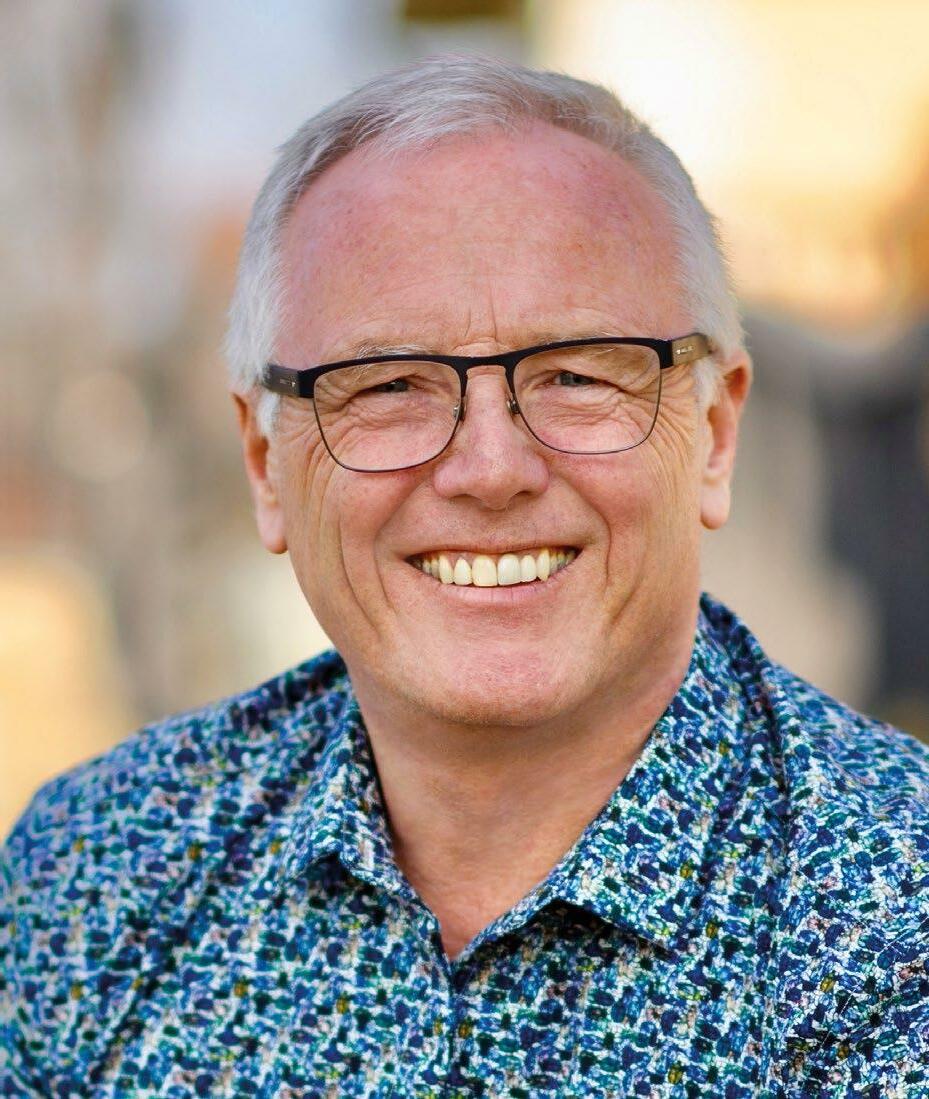
What was your journey to be coming CEO of one of Singapore’s leading biotech companies?
I have worked in the global pharma ceutical industry since 1984 in the UK, Europe, the US and Japan. I was attracted to Singapore because of the evolution of structured and inte grated thinking about how to devel op this country into a leading player in the biotech space, including cell therapy. Here we find outstanding science being directly translated into medical practice.
year. Two research projects are very close to going into the pre-clinical phase. We also have an ongoing col laboration with US-based synthetic DNA maker Twist Biosciences.
How has Singapore’s investment climate helped you?
The investment environment is very supportive and connected. Investors are internationally mind ed and are very helpful in terms of pointing out where collaborations and synergies are possible. We also have very talented, motivated and focused young individuals who are exceptionally enthusias tic about translating science into clinical effect.
What are Medisix’s long-term goals?
2016 Company founded by Professor Dario Campana alongside Lightstone Ventures.
2017/18
Development of anti-CD7 CAR T-cells with PEBL blockade (PCART7) to target T-cell malignancies.
2019/20
A leading biosciences hub, Singapore is the choice location for pharmaceutical and biotech companies developing cutting-edge healthcare solutions.

Singapore’s medicine and biotech manu facturing base has grown by a factor of three since 2000. In 2016, the sector produced more than S$16 billion worth of prod ucts for global markets, and S$4 billion in public sector research funding has been committed to the Health and Biomedical Sciences Domain. Today, eight of the world’s top10 pharmaceutical companies have facilities in Singapore, manufacturing four of the top10 drugs by global revenue. Skilled talent pools, strong manufacturing capabilities, and a thriving research ecosystem
have drawn pharmaceutical and biotechnology firms to set up operations here. Indus try leaders including Pfizer, Novartis, Sanofi, AbbVie and Amgen have established global manufacturing hubs, benefit ing from a pro-business envi ronment and strong connec tions to the rest of Asia.
Your company develops cutting edge immune cell therapies. What potential do you see for this technology?
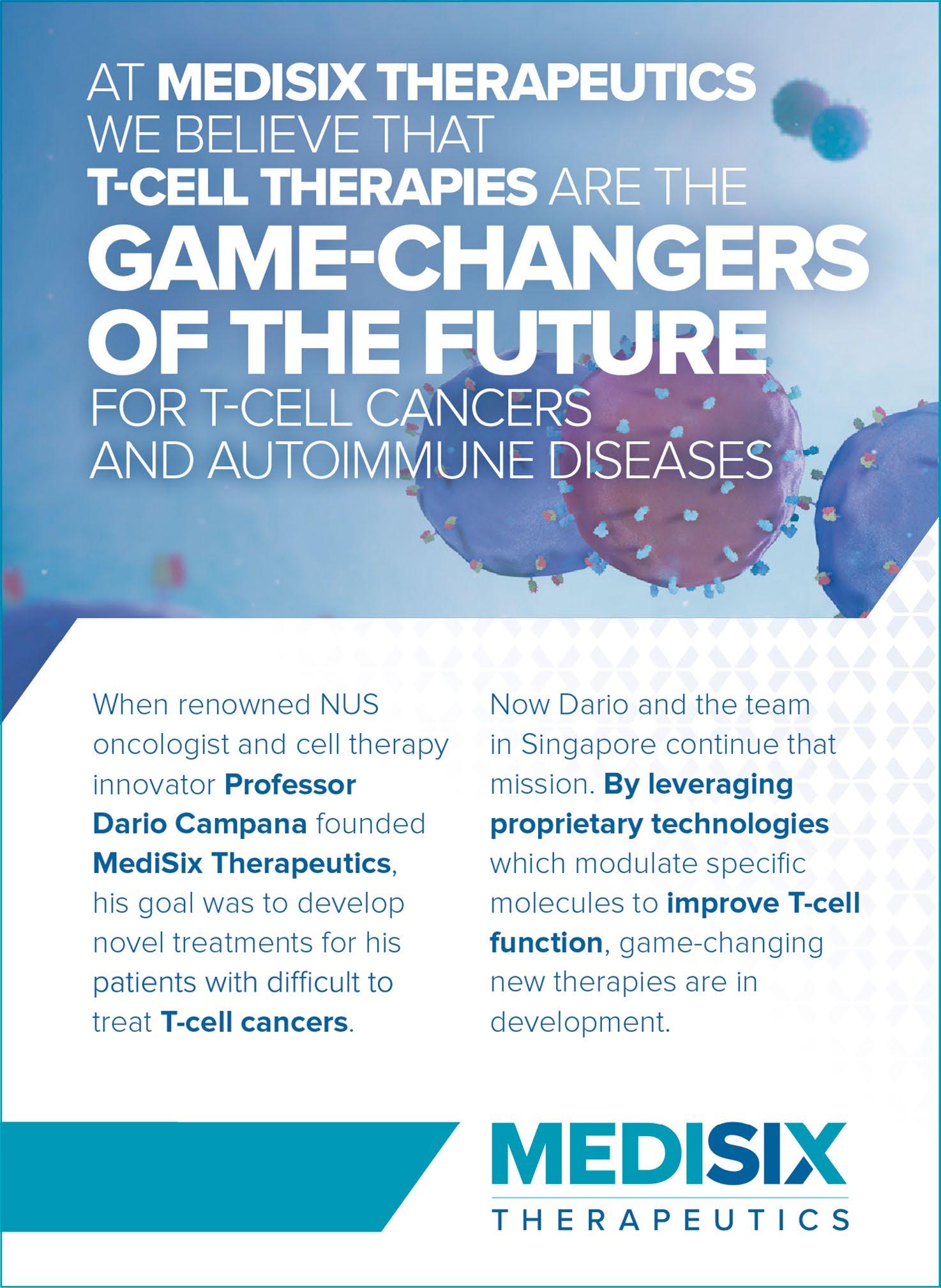
T-cells play a positive natural role in combating disease. We are fo cused on the latest bioengineering techniques to tackle cancers that are traditionally difficult to treat. Our founder, Professor Campana, was at the forefront of the devel opment of chimeric antigen recep tor T cell (CAR-T) therapy. Now, we are working across a range of can cers and applying truly innovative technologies which enable us to imagine new ways to utilise T-cells and the body’s own immune sys tem to fight the disease.
What key projects do you have in the pipeline?
One asset is planned to enter clin ical trials in Europe this year, and into Phase I study in the US next
Our aim is to be a sustainable, scalable organization. We are not just about building a technology, selling it and then moving on to the next thing. Our goal is entirely focused on scaling up our strength and being sustainable by looking at how we can develop our intel lectual property to create value and attract additional investment. We are especially keen to build more collaborations in the UK, which is a leading centre in some of the areas we specialize in.
How does the Digital Economy Agreement, signed last year between the UK and Singapore, facilitate this?
We are interested in the movement of patient data, the ability to work with regulators seamlessly, and the opportunity to share real-time data. We are strong on innovative and practical research, but would like to accelerate projects into develop ment and then the clinic. Seamless networking with institutions in the UK will help us with that.
First clinical experience in Singapore with patients suffering from T-cell acute lymphoblastic leukaemia (T-ALL).
2022
Initial clinical trials planned in Europe.
“The ethos we are developing is that we are science-led, clinically relevant, then commercially successful”
Singapore manufac tures four of the world’s top-10 drugs
Known for its lush gardens, high-end shopping districts, and luxury hotels, Singapore is building its tourism industry to post-pandemic levels through a sustainable vision.





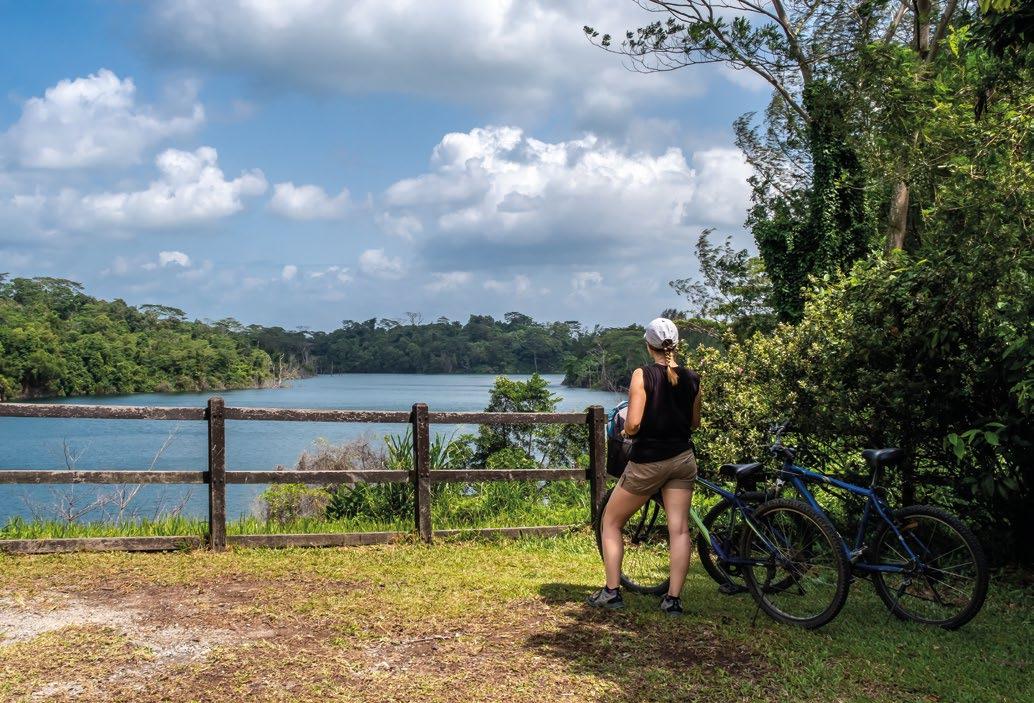




Singapore has long been regarded for its lush man icured gardens and treelined avenues. Nearly half of Singapore’s land area is under green cover, and the Singapore Tour ism Board is keen to build on the citystate’s reputation as the Garden City through its Tourism Sustainability Programme, in order to raise tourism growth to pre-pandemic levels.
Before COVID, Singapore’s tourism industry reported steady growth year-on-year from 10.1 million vis itors in 2008, to a record high of 19.12 million in 2019, bringing in US$20.42 billion to the economy. Since relaxing quarantine rules in April 2022, tourism receipts in the first quarter of 2022 have re bounded to US$1.3 billion, a 213% year-on-year increase over the same period in 2021.

Singapore’s Tourism Board projects that the industry’s growth trajectory will return to pre-COVID levels by the mid-2020s
“Singapore coined the term ‘city in a garden’ long before current debate over envi ronmental sustaina bility”
Loh CEO, Gardens by the Bay